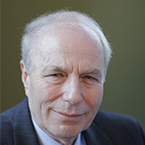
Renowned for the co-discovery of ubiquitin-mediated protein degradation, which led to a 2004 Nobel Prize, Dr. Hershko helped explain how the cell functions as a highly efficient checking station wherein proteins are built up and broken down at a furious rate. The molecule he called ubiquitin is an important player in cell death; it is the “label” that attaches to a protein on the way for disassembly in the cells, waste disposers, or proteasomes. Many important processes are governed by ubiquitin-mediated protein degradation, and understanding it informs drug development against diseases that arise when it does not work properly, such as cervical cancer and cystic fibrosis. The ubiquitin-proteasome pathway has a critical role in maintaining the homeostasis of cells and is believed to be involved in the development and progression of cancer, muscular and neurologic diseases, and immune and inflammatory responses.
Dr. Hershko has received numerous awards from his colleagues and his adopted homeland. Born in Hungary, he fled the Nazis and later emigrated from Hungary to Israel in 1950. In 2005, in a poll of the Israeli general public, he was named the co-31st greatest Israeli of all time.
Career Highlights
2004 Nobel Prize in Chemistry
2003 Elected Foreign Associate, National Academy of Sciences, Washington, DC
2001 Wolf Prize in Medicine, Israel
2000 Albert Lasker Award for Basic Medical Research
1999 Gairdner International Award
1977 Rose Laboratory, Institute for Cancer Research, Fox Chase Cancer Center
1971 Chairman, Department of Biochemistry, Rappaport Faculty of Medicine, Technion-Israel Institute of Technology
1969 PhD, Hebrew University-Hadassah Medical School
1965 MD, Hebrew University-Hadassah Medical School